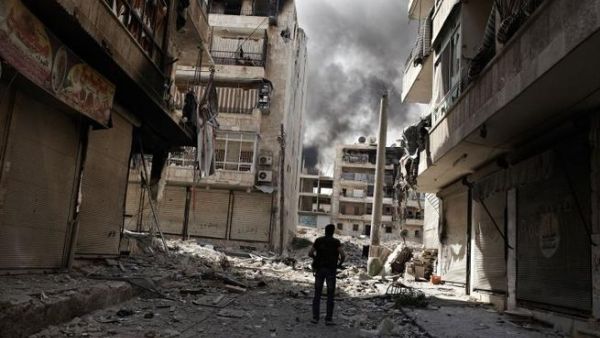The Syrian government believes the civil war has reached a stalemate and therefore would request a cease-fire were long-awaited Geneva II talks to be held, the deputy prime minister said Thursday.
“Neither the armed opposition nor the regime is capable of defeating the other side,” Qadri Jamil said in an interview with the Guardian newspaper. “This zero balance of forces will not change for a while.”
Were Geneva II talks to take place, he said, the regime would propose: “An end to external intervention, a cease-fire and the launching of a peaceful political process in a way that the Syrian people can enjoy self-determination without outside intervention and in a democratic way.”
Jamil also insisted that the current regime was changing.
“Let nobody have any fear that the regime in its present form will continue. For all practical purposes the regime in its previous form has ended. In order to realize our progressive reforms we need the West and all those who are involved in Syria to get off our shoulders,” he said.
The Syrian opposition has, thus far, refused to take part in a second round of Geneva talks unless President Bashar Assad commits to standing down.
In Washington, U.S. Secretary of State John Kerry said the U.N. Security Council must be prepared to agree on a binding resolution on the regime’s chemical weapons next week, following a framework agreement tabled by the U.S. and Russia in Geneva at the weekend.
“Now the test comes. The Security Council must be prepared to act next week. It is vital for the international community to stand up and speak out,” he added.
Kerry is leaving Sunday to join world leaders gathering in New York for the annual U.N. General Assembly set to be dominated by the civil war in Syria.
“I would say to the community of nations, time is short. Let’s not spend time debating what we already know,” Kerry pleaded.
“Instead, we have to recognize that the world is watching to see whether we can avert military action and achieve through peaceful means” the destruction of Syria’s chemical arms stocks, he said.
“The complete removal of Syria’s chemical weapons is possible here, through peaceful means,” he insisted.
Members of the world’s chemical weapons watchdog – the Organization for the Prohibition of Chemical Weapons – will meet Sunday to discuss how to fast-track moves to secure and destroy Syria’s poison gas and nerve agent arsenal, a spokesman said Thursday.
Russian President Vladimir Putin said he was confident but not 100 percent sure that Syria would carry out its commitments to destroy its chemical weapons stockpiles under a Russia-U.S. agreement.
“Will we manage to carry it through? I can’t say 100 percent, but all that we have seen recently, in the last few days, inspires confidence that it is possible and that it will be done,” Putin said at a meeting of the Valdai international discussion club with Western politicians and journalists in the northwestern Novgorod region.
Putin said that Assad’s government was already putting into practice the proposals announced by Kerry and Russian Foreign Minister Sergei Lavrov in Geneva.
Under the U.S.-Russia deal, inspectors are to be on the ground in Syria by November. During that month, they are to complete their initial assessment and all mixing and filling equipment for chemical weapons is to be destroyed.
All components of the chemical arms program are to be removed from the country or destroyed by mid-2014.
Both the U.S. and Russia are among the 41 nations with representatives on the OPCW’s executive council.
“Will we manage to convince Assad or not? I don’t know,” Putin said. “But so far everything looks as if Syria has fully agreed with our proposal and is ready to act according to the plan that is being developed by the international community at the United Nations.”Russia has no current plans to destroy Syrian chemical weapons on its own territory, Russian Defense Minister Sergei Shoigu said.
“We have factories for the destruction of chemical weapons, but there is a big difference between ‘ready’ and ‘willing.’”
In a first step, Syria has already announced it will abide by the terms of the international ban on chemical weapons, Putin said.
“These are practical steps that the Syrian government has already taken.”
The U.S.-Russia plan is the result of intense diplomacy to avert U.S.-led military action against the Syrian regime, which Washington and its allies blame for a deadly gas attack on a Damascus suburb last month.
The U.S. has however insisted that the threat of force should remain on the table should Syria fail to comply with the agreement.
“If the attempts to resolve the problem peacefully aren’t successful, this will be extremely bad,” Putin acknowledged.
But he insisted that only the U.N. Security Council could discuss the question of whether to use force against Syria.
The Russian leader, whose government is Syria’s most powerful ally, insisted it was not proven who was behind the chemical weapons attack in Ghouta that killed hundreds of people including many children on Aug. 21. “It’s clear that [chemical] arms were used ... It’s just not clear who did it,” he said.
Assad, in an interview late Wednesday with U.S. television network Fox News, insisted his country was the victim of infiltration by foreign-backed Al-Qaeda fighters. “What we have is not civil war. What we have is war. It’s a new kind of war,” he said, alleging that Islamist guerrillas from more than 80 countries had joined the fight.









